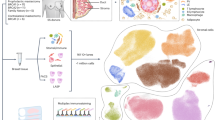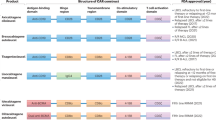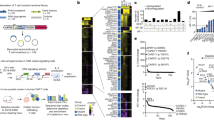Abstract
The Philadelphia chromosome, a chromosomal abnormality that encodes BCR–ABL1, is the defining lesion of chronic myelogenous leukaemia (CML) and a subset of acute lymphoblastic leukaemia (ALL)1,2,3. To define oncogenic lesions that cooperate with BCR–ABL1 to induce ALL, we performed a genome-wide analysis of diagnostic leukaemia samples from 304 individuals with ALL, including 43 BCR–ABL1 B-progenitor ALLs and 23 CML cases. IKZF1 (encoding the transcription factor Ikaros) was deleted in 83.7% of BCR–ABL1 ALL, but not in chronic-phase CML. Deletion of IKZF1 was also identified as an acquired lesion at the time of transformation of CML to ALL (lymphoid blast crisis). The IKZF1 deletions resulted in haploinsufficiency, expression of a dominant-negative Ikaros isoform, or the complete loss of Ikaros expression. Sequencing of IKZF1 deletion breakpoints suggested that aberrant RAG-mediated recombination is responsible for the deletions. These findings suggest that genetic lesions resulting in the loss of Ikaros function are an important event in the development of BCR–ABL1 ALL.
This is a preview of subscription content, access via your institution
Access options
Subscribe to this journal
Receive 51 print issues and online access
$199.00 per year
only $3.90 per issue
Buy this article
- Purchase on Springer Link
- Instant access to full article PDF
Prices may be subject to local taxes which are calculated during checkout



Similar content being viewed by others
Accession codes
Primary accessions
Gene Expression Omnibus
Data deposits
The primary SNP microarray data have been deposited in NCBIs Gene Expression Omnibus (GEO, http://www.ncbi.nlm.nih.gov/geo/) and are accessible through GEO Series accession numbers GSE9109–GSE9113.
References
Ribeiro, R. C. et al. Clinical and biologic hallmarks of the Philadelphia chromosome in childhood acute lymphoblastic leukemia. Blood 70, 948–953 (1987)
Gleissner, B. et al. Leading prognostic relevance of the BCR-ABL translocation in adult acute B-lineage lymphoblastic leukemia: a prospective study of the German Multicenter Trial Group and confirmed polymerase chain reaction analysis. Blood 99, 1536–1543 (2002)
Goldman, J. M. & Melo, J. V. Chronic myeloid leukemia–advances in biology and new approaches to treatment. N. Engl. J. Med. 349, 1451–1464 (2003)
Daley, G. Q., Van Etten, R. A. & Baltimore, D. Blast crisis in a murine model of chronic myelogenous leukemia. Proc. Natl Acad. Sci. USA 88, 11335–11338 (1991)
Williams, R. T., Roussel, M. F. & Sherr, C. J. Arf gene loss enhances oncogenicity and limits imatinib response in mouse models of Bcr-Abl-induced acute lymphoblastic leukemia. Proc. Natl Acad. Sci. USA 103, 6688–6693 (2006)
Melo, J. V. The diversity of BCR-ABL fusion proteins and their relationship to leukemia phenotype. Blood 88, 2375–2384 (1996)
Melo, J. V. & Barnes, D. J. Chronic myeloid leukaemia as a model of disease evolution in human cancer. Nature Rev. Cancer 7, 441–453 (2007)
Mullighan, C. G. et al. Genome-wide analysis of genetic alterations in acute lymphoblastic leukaemia. Nature 446, 758–764 (2007)
Hahm, K. et al. The lymphoid transcription factor LyF-1 is encoded by specific, alternatively spliced mRNAs derived from the Ikaros gene. Mol. Cell. Biol. 14, 7111–7123 (1994)
Molnar, A. & Georgopoulos, K. The Ikaros gene encodes a family of functionally diverse zinc finger DNA-binding proteins. Mol. Cell. Biol. 14, 8292–8303 (1994)
Molnar, A. et al. The Ikaros gene encodes a family of lymphocyte-restricted zinc finger DNA binding proteins, highly conserved in human and mouse. J. Immunol. 156, 585–592 (1996)
Rebollo, A. & Schmitt, C. Ikaros, Aiolos and Helios: transcription regulators and lymphoid malignancies. Immunol. Cell Biol. 81, 171–175 (2003)
Sun, L., Liu, A. & Georgopoulos, K. Zinc finger-mediated protein interactions modulate Ikaros activity, a molecular control of lymphocyte development. EMBO J. 15, 5358–5369 (1996)
Klug, C. A. et al. Hematopoietic stem cells and lymphoid progenitors express different Ikaros isoforms, and Ikaros is localized to heterochromatin in immature lymphocytes. Proc. Natl Acad. Sci. USA 95, 657–662 (1998)
Sun, L. et al. Expression of dominant-negative Ikaros isoforms in T-cell acute lymphoblastic leukemia. Clin. Cancer Res. 5, 2112–2120 (1999)
Sun, L. et al. Expression of aberrantly spliced oncogenic ikaros isoforms in childhood acute lymphoblastic leukemia. J. Clin. Oncol. 17, 3753–3766 (1999)
Sun, L. et al. Expression of dominant-negative and mutant isoforms of the antileukemic transcription factor Ikaros in infant acute lymphoblastic leukemia. Proc. Natl Acad. Sci. USA 96, 680–685 (1999)
Nakase, K. et al. Dominant negative isoform of the Ikaros gene in patients with adult B-cell acute lymphoblastic leukemia. Cancer Res. 60, 4062–4065 (2000)
Olivero, S. et al. Detection of different Ikaros isoforms in human leukaemias using real-time quantitative polymerase chain reaction. Br. J. Haematol. 110, 826–830 (2000)
Nishii, K. et al. Expression of B cell-associated transcription factors in B-cell precursor acute lymphoblastic leukemia cells: association with PU.1 expression, phenotype, and immunogenotype. Int. J. Hematol. 71, 372–378 (2000)
Takanashi, M. et al. Expression of the Ikaros gene family in childhood acute lymphoblastic leukaemia. Br. J. Haematol. 117, 525–530 (2002)
Tonnelle, C. et al. Overexpression of dominant-negative Ikaros 6 protein is restricted to a subset of B common adult acute lymphoblastic leukemias that express high levels of the CD34 antigen. Hematol. J. 4, 104–109 (2003)
Klein, F. et al. BCR-ABL1 induces aberrant splicing of IKAROS and lineage infidelity in pre-B lymphoblastic leukemia cells. Oncogene 25, 1118–1124 (2006)
Wang, J. H. et al. Selective defects in the development of the fetal and adult lymphoid system in mice with an Ikaros null mutation. Immunity 5, 537–549 (1996)
Georgopoulos, K. et al. The Ikaros gene is required for the development of all lymphoid lineages. Cell 79, 143–156 (1994)
Winandy, S., Wu, P. & Georgopoulos, K. A dominant mutation in the Ikaros gene leads to rapid development of leukemia and lymphoma. Cell 83, 289–299 (1995)
Fugmann, S. D. et al. The RAG proteins and V(D)J recombination: complexes, ends, and transposition. Annu. Rev. Immunol. 18, 495–527 (2000)
Weir, B. A. et al. Characterizing the cancer genome in lung adenocarcinoma. Nature 450, 893–898 (2007)
Kirstetter, P. et al. Ikaros is critical for B cell differentiation and function. Eur. J. Immunol. 32, 720–730 (2002)
Drexler, H. G. The Leukemia-Lymphoma Cell Line Facts Book 1st edn (Academic Press, London, 2001)
Manabe, A. et al. Interleukin-4 induces programmed cell death (apoptosis) in cases of high-risk acute lymphoblastic leukemia. Blood 83, 1731–1737 (1994)
Ehrich, M. et al. Quantitative high-throughput analysis of DNA methylation patterns by base-specific cleavage and mass spectrometry. Proc. Natl Acad. Sci. USA 102, 15785–15790 (2005)
Acknowledgements
The authors thank Z. Cai for technical help, K. Rakestraw and J. Armstrong for assistance with sequencing, R. Williams and C. Sherr for the provision of Arf null hematopoietic cells and BCR–ABL1 retroviral vectors, O. Heidenreich for providing the SKNO-1 cell line, and D. Campana for providing the OP1 cell line. This study was supported by the American Lebanese Syrian Associated Charities of St Jude Children’s Research Hospital. C.G.M. was supported by grants from the National Health and Medical Research Council (Australia), the Royal Australasian College of Physicians, and the Haematology Society of Australasia.
Author Contributions C.G.M. collected and extracted clinical samples, performed laboratory assays and analysed data. C.B.M., L.A.P., J.D. and I.R. performed laboratory assays. J.M. analysed SNP array data. D.W., T.P.H., M.M.L., C.-H.P., M.V.R. and S.A.S. collected clinical samples and data. C.G.M and J.R.D designed the study and wrote the manuscript, which was reviewed by all authors.
Author information
Authors and Affiliations
Corresponding author
Supplementary information
Supplementary information
The file contains Supplementary Results; Supplementary Tables 1-7; Supplementary Figures 1-8 with Legends and additional references. (PDF 2855 kb)
Rights and permissions
About this article
Cite this article
Mullighan, C., Miller, C., Radtke, I. et al. BCR–ABL1 lymphoblastic leukaemia is characterized by the deletion of Ikaros. Nature 453, 110–114 (2008). https://doi.org/10.1038/nature06866
Received:
Accepted:
Published:
Issue Date:
DOI: https://doi.org/10.1038/nature06866
This article is cited by
-
‘Evaluation of adverse prognostic gene alterations & MRD positivity in BCR::ABL1-like B-lineage acute lymphoblastic leukaemia patients, in a resource-constrained setting
British Journal of Cancer (2023)
-
The role of transcription factors in shaping regulatory T cell identity
Nature Reviews Immunology (2023)
-
IKAROS: from chromatin organization to transcriptional elongation control
Cell Death & Differentiation (2023)
-
Synergistic effect of combined PI3 kinase inhibitor and PARP inhibitor treatment on BCR/ABL1-positive acute lymphoblastic leukemia cells
International Journal of Hematology (2023)
-
The recombinome of IKZF1 deletions in B-cell precursor ALL
Leukemia (2023)
Comments
By submitting a comment you agree to abide by our Terms and Community Guidelines. If you find something abusive or that does not comply with our terms or guidelines please flag it as inappropriate.



